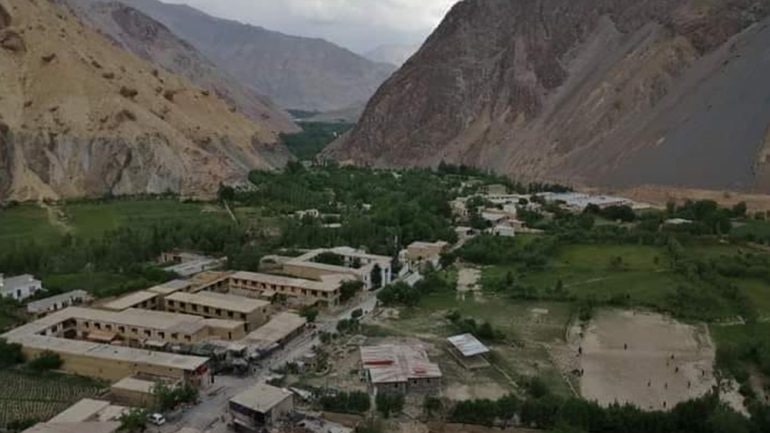Balkhab War; the Path to a New Transformation
Given these tangible facts on the ground, it was wise and prudent for the Ta’liban to manage the Balkhab crisis with patience, and to think of other measures to contain it

The war began in the northern Balkhab district. This was the worst news for Afghanistan after the devastating earthquake in Paktika and Khost provinces. As if the destiny of this land is plagued with insecurity, calamity, and crisis. Any group that takes power either does not have a fundamental goal and motivation to establish stability and security or cannot mitigate the crisis and obviate distrust, therefore, it willingly or unwillingly falls into the trap of irreconcilable foes.
Here, we neither want to judge nor intend to identify the culprit of the Balkhab war; because neither the record of Mawlawi Mahdi Mujahid can be defended by the residents of Balkhab nor the Ta’liban genealogical monopoly be denied. Both are equally responsible for the catastrophes that the war in Balkhab will bring. The catastrophes that will directly engulf the people from the beginning to the end of this deadly story, and the innocent people and the civilians will be the ashes of this ruthless war.
Beside the escalation of racist and fascist attitudes among the Ta’liban, the racial and tribal sentiments of others also flare up, prompting naïve and young people through the virtual myths of Facebook and the media outlets that will only annihilate all goodness.
In the past two months, shortly after the Taliban became somewhat confident that their rule will continue, four of the group’s commanders in Panjshir, Takhar, Sar-e-Pul, and Badakhshan provinces split and turned to armed clashes with the Taliban.
Qari Waqas, one of the commanders of the Ta’liban’s “Red” Brigade, separated from the group after its intelligence took out four of his guests from his house in Badakhshan’s Tagab district and shot them to death for allegedly collaborating with the Resistance Front about three weeks ago.
Mawlawi Abdul Qadir was another non-Pashtun Taliban commander in northern Takhar province, who recently severed ties with the group.
Farmanda Malik, a former jihadi commander, joined the Taliban and was an important member of the group in Panjshir province. He rose against the Taliban in May.
Mawlawi Mahdi Hazara was also the fourth powerful and influential commander of the Taliban, who officially turned into armed clashes against the Taliban last Thursday.
The Uzbek commanders of the Taliban, like Makhdoom Alem and others, are not happy with the group as well. Despite many sacrifices to bring the Taliban to power, they are now angered at them and experiencing a wrong time mixed with humiliation.
All of these indicate that the ethnocentrism in various ranks of the Taliban is rampant, making any non-Pashtun unbearable for them. Other intra-group factors, such as power struggles or disputes over the sharing of resources, may turn key Taliban commanders against each other, but what is most decisive and influential is the ethnic alienation of non-Pashtun commanders within the Ta’liban structure.
After all, war is not a joke; it has many unfortunate consequences, and its harmful consequences are irreparable either for the Taliban rule or for the civilian population, especially for social groups that do not have an ethnic relationship with the Taliban.
What makes the problem in our country worse is its ethnicization. For example, Mawlawi Mahdi Mujahid’s disobedience to the orders and prohibitions of the Taliban’s central rule will be counted on all Shiites and Hazaras who have ethnic relations with the rebellious commander of the Taliban, and they will also pay for this disobedience.
Naturally, no one can expect justice in this war-torn country, but the nakedness and pervasiveness of oppression are not in the interest of the ruling group either.
Exactly one day after the deadly natural disaster in the Khost and Paktika provinces, and instead of bringing all the people from across the country to sympathetically help the earthquake victims and provide them with humanitarian and national assistance, the ruling group went to war with his non-Pashtun commander to further deepen social distances, making the human crisis more complex and unsolvable.
The atrocities committed against the northern Tajiks of Panjshir, Takhar, and Baghlan in the last ten months have made the social and identical distances even stronger, peaking the endless grudges in their hearts in a way that this one-sided oppression cannot be compensated by any trick or tact.
Given these tangible facts on the ground, it was wise and prudent for the Ta’liban to manage the Balkhab crisis with patience, and to think of other measures to contain it rather than enter a war with Mawlawi Mahdi. The beginning of the war in Balkhab indicated that the Taliban’s diplomatic management capability is much weaker than what one could even think of it.